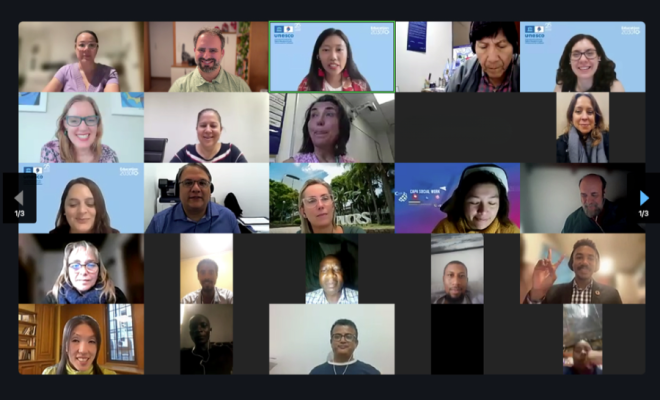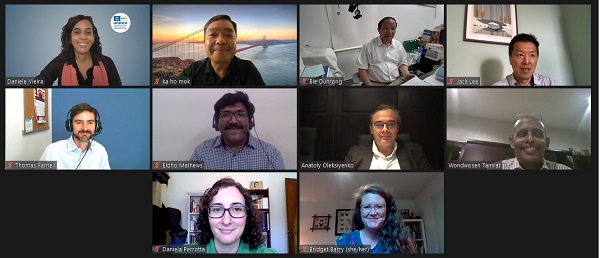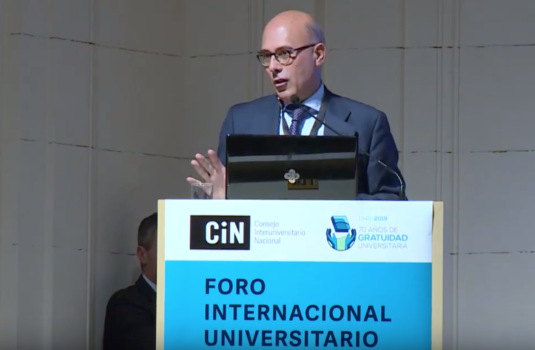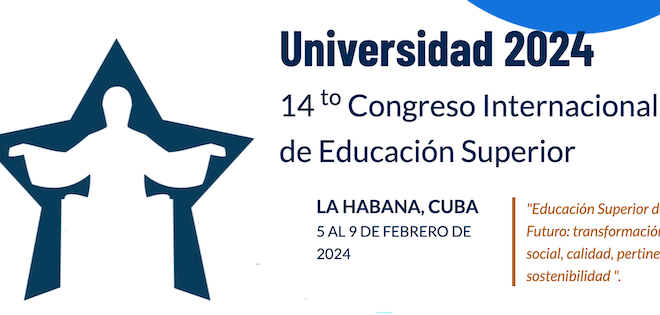How can artificial intelligence shape the future of higher education?

The SDG Learning, Training and Practice is a series of capacity building and knowledge learning training sessions focused on essential topics related to the implementation of the 2030 Agenda for Sustainable Development, organized by UN DESA & UNITAR and held annually as a special event on the margins of the United Nations High-level Political Forum on Sustainable Development.
As part of this series, UNESCO International Institute for Higher Education in Latin America and the Caribbean (IESALC) designed a 2-hour online training to address the Future of Education and Artificial Intelligence (AI) in our rapidly changing societies. The main objective of the training was to explore with Member States and other stakeholders the various aspects through which AI can shape the future of education, and the strategies and tools that education can mobilize to constructively engage with AI for the mutual benefit of education stakeholders.
Francesc Pedró, Director of UNESCO IESALC, opened the session by highlighting the significant digital transformation in education due to globalization and societal changes. He emphasized the role of AI in reshaping knowledge production and sharing, teaching, learning, and institutional management. He stated, “Artificial intelligence (…) is playing a huge role in reshaping the landscape of knowledge, production, and sharing (…) It is our job to ensure that the various stakeholders are equipped so that they can be meaningfully engaged in innovative ways to transform education.”
On the topic of meaningful youth and student engagement, Jacob Blasius, Executive Director of the Global Student Forum, suggested that critical thinking is needed when addressing how to use of AI and digital tools, as AI has the potential to reshape the learning environment. A diverse group of stakeholders need to discuss and learn how to use this tool adequately, so that it is a “good force in the world.”
The session continued with a focus on the ethical implications of AI in education. Arianna Valentini, Senior Analyst for Research and Foresight at UNESCO IESALC, discussed the challenges of integrating IA, including bias in data, lack of inclusion and diversity, sustainability concerns, and the potential for commercialization to drive development only in profitable areas: “One of the main issues regarding artificial intelligence in higher education is the lack of inclusion and diversity… The biases that are inherent to the data with which AI is trained, will also be reproduced by artificial intelligence.” She, therefore, called for ethical governance, transparency, and multi-stakeholder engagement in the development and use of AI.
Nearly half of the world’s 6 million schools are not yet connected to the Internet today according to Ursula Wyhoven, Director and Representative to the UN at ITU. She added that women and marginalized groups are disproportionately affected. She further suggested that “these facts and figures really help to really, underscore that connecting every school to the Internet is essential to bridge the digital divide”. She highlighted the Giga initiative, which aims to connect every school to the Internet and provides displays a model for addressing connectivity challenges.
Daniele Vieira, Lead of Gender Projects, UFPE, discussed gender disparities in Science, Technology, Engineering and Mathematics (STEM) fields and leadership positions in higher education. She shared that “only one in three scientists worldwide is a woman” and that “when we look into the upper levels of scientific careers or hierarchies within academia, we see that the proportion of women decreases”. This data calls for transformative initiatives to promote gender equality in these areas.”
Recommendations and calls to action
The session included breakout sessions, rooms where participants discussed recommendations for integrating AI into education. The recommendations included promoting gender equality in STEM, designing AI algorithms to reduce bias and discrimination, engaging stakeholders in AI governance, and ensuring access to digital tools and infrastructure. Other points discussed included are how AI offers the potential to create personalized learning pathways for students, allowing them to learn at their own pace, and its potential innovative pedagogical uses.
This can enhance the educational experience by tailoring content to individual needs and preferences. It can also improve the efficiency of educational processes and support services. Additionally, AI can facilitate advances in research by providing tools for data analysis, pattern recognition, and the generation of new insights, leading to breakthroughs in various fields, including education itself. Initiatives such as “Young People on Transforming Education” project to promote intergenerational engagement in the digital transformation of education, fostering collaboration and shared learning.
Overall, the training session provided valuable insights and recommendations for promoting gender equality, ethical AI implementation, multi-stakeholder engagement and partnerships, and addressing connectivity challenges in education. The diverse perspectives and collaborative discussions among stakeholders highlighted the urgency and importance of considering ethical, inclusive, and sustainable approaches to integrating AI in education.
Among the rich discussion and debate that was generated during the training, experts and participants highlighted the potential of AI to personalize education, its innovative use in pedagogy, its advance contribution to research and knowledge production, as well as using AI as a tool to promote intergenerational engagement. There was a common consensus to enhance partnerships and to support multi-stakeholder integration in the future of education through capacity building activities, ensuring that all stakeholders are equipped to engage meaningfully with AI. The session served as a platform for engaging with various stakeholders and sharing best practices and recommendations for a more sustainable and equitable future of education.
Watch the trainning session:
Useful links:
- Futures of Higher Education Project, UNESCO IESALC
- Preliminary study on the Ethics of Artificial Intelligence, the World Commission on the Ethics of Scientific Knowledge and Technology
- Capacity Building OER Platform Campus IESALC, UNESCO IESALC
- Digital Transformation of Higher Education, UNESCO IESALC
- ChatGPT and Artificial Intelligence in higher education, UNESCO IESALC
- Digital Progress and Trends Report 2023, World Bank
- Women’s Leadership in the Digital Era: Agility, Adaptability and Fluency, APEC Policy Partnership on Women and the Economy
- Young People on Transforming Education, UNESCO IESALC
- Youth Engagement Toolkit for Future of Education, UNESCO IESALC
- Guidebook for Student Unions: AI in Education by Global Student Forum
- GIGA Project by ITU and UNICEF
RELATED ITEMS








